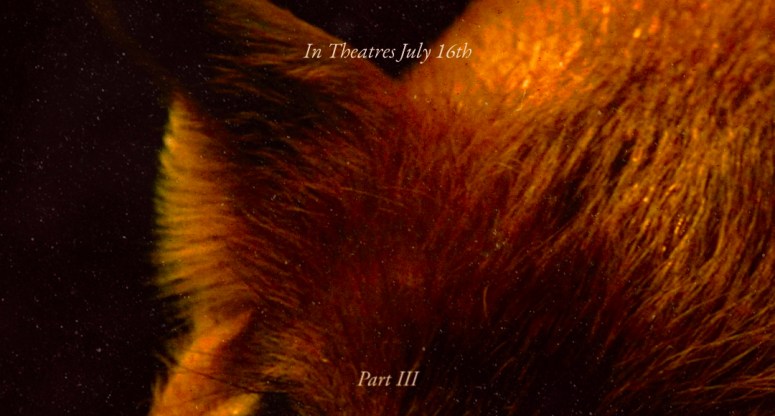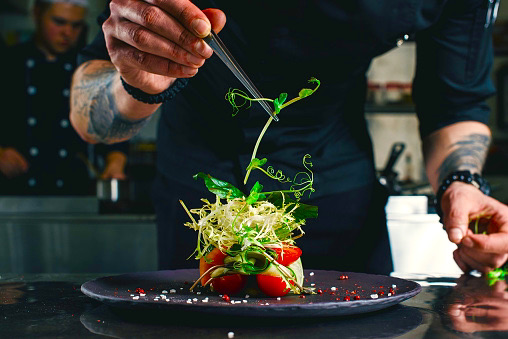A languishing, quiescent, rustic melancholic treatise on repose, natural friendships, chefs, materialism, & loss in the misanthropic Oregonian wilderness, Pig is a violent revenge-drama with a soul – and exhibition of Cage’s [still-formidable] acting talents. 8.7/10.
…
Plot Synopsis: Living alone in the Oregon wilderness, a truffle hunter returns to Portland to find the person who stole his beloved pig.
*Possible Spoilers Ahead*
Official CLC Review

Neon Is Back
The Studio Behind The Greatest Film Of The 2010’s [Parasite] & Another Top 5 One In LGBTQ+ Masterpiece [POALOF] Is Back W. 2000’s Movie-Star Gone M.I.A. In Caribbean
Photograph Courtesy Of: NEON, Saturn, & Valparaiso
The Best Film Of The 21st Century. That’s a lifetime achievement of braggadocio the studio execs at NEON quite arguably have the right to plaster over company walls at their NYC headquarters, and if the multi-Oscar Best Picture South Korean masterpiece Parasite wasn’t enough, they also have another Top 5 Of 2010’s entry in the groundbreaking hyper-stylized LGBTQ+ romance film: Portrait Of A Lady On Fire, as well as many other magnificent pictures like Honeyland, Ingrid Goes West, and Three Identical Strangers. A resumé like that would certainly give any studio enough legacy, prestige, and fulfillment to retire to a private island in the Caribbean like one of Hollywood’s premiere 2000’s movie-stars [Nicholas Cage] publicly did – but they’re back with insatiable young-blood hunger/drive for more and another Oscars-caliber piece of filmmaking. In the process, they’ve also managed to bring that very aforementioned name back from the dead in a thunderous throwdown symbolizing the two never lost a step… and aren’t going anywhere. A languishing, quiescent, elegant, rustic melancholic treatise on the worlds of repose, natural friendships, materialism, authenticity, food, and loss in the misanthropic Oregonian wilderness, Pig is a revenge-drama with a soul – a chef’s dish served in an endless fast-food purgatory cinematic drive-thru and showcase of Cage’s [still-formidable] acting talents.

The Pig
A Film That Symbolizes Its Eponymous Creature: One Of A Slovenly Non-Intelligent Exterior Physiology Hiding Complexities & Aptitude – A Tribute To Animal Friendships
Photograph Courtesy Of: NEON, Saturn, & Valparaiso
Pig is a chef’s dish served an endless purgatoric fast-food cinematic drive-thru. The film is a panegyric to cooking, but tackles a curated five-course meal’s worth of complex themes through the prismatic lens of carbohydrates, all with the grace and precision of a chef’s knife slicing through the finest of fresh ingredients. Pig is an ode to nature and animal friendships: a brilliant subversion of the food-chain to find humanity and natural bonds by turning a world-famous chef [by-profession only concerned with animals in the context of tools for meals, especially bacon/ham-clad pigs] into someone whose best friend is a pig he finds the same companionship, soul, and love in as we do in our most cherished pets. Even though he doesn’t need her for the business partnership of truffle-foraging/selling implied by the film but later-revealed he can do on his own, he goes on a revenge-thriller journey into the depths of underground fighting-rings and mafiaic don-houses like a modern-day The Odyssey just to get her back because he loves her: heartstring-pulling emotion of rare & increasingly-endangered speciation in cinema today. The cinematography and acoustic landscape aid the movie’s eulogization of the elements and rusticism: an experience as refreshing as a dip by the lake of a fall-set Pacific Northwest wilderness in the heights of cabin-fever COVID-19 quarantine. The breathtaking sublime of the Oregonian wild by seas of green fringed with falling red-brown leaves is painted by Scola’s ocular and cinematographic prowess – one that makes you want to follow Hemingway, Frost, Wordsworth, & Henry David Thoreau’s advice on moving out to the woods over the [harshly-juxtaposed] city lights. This is alongside one of the great scores of 2021: one that knows when to strategically use the dying elegance-tool of silence to let us enjoy the peace and quiet we go to nature in soul-quenching search of by amplifying background diegetics of birds chirping and the nirvana of water flowing on a riverside when we’re now so used to being inundated with electronic orchestration and cacophony in pop cinema.

‘I Went To The Woods To Live Deliberately’
A Panegyric To Nature, Beautiful Oregonian Wilderness Evocative Of Hemingway, Frost, & Wordsworth Poems; A Score Of A Light Baker’s Touch Sprinkling Piano Keys Contextualized In Natural Peace|Quiescence
Photograph Courtesy Of: NEON, Saturn, & Valparaiso
Composers Grasas & Klein manage to lightly sprinkle atmospheric piano keys with the touch of a career-baker’s signature powdering technique, bird’s wings fluttering, or morning dew gliding off a leaf’s surface for contrastive majesty, juxtaposed with heavy, starchy, flavor-packed orchestration in the film’s powerful emotional scenes. The score is career work now our top-choice for the Academy Awards in sound editing & score next spring by how masterfully it pulls off this seamless blend. Pig is, foremost, a treatise on loss: its major theme and one that drives the film’s events not only through the story of a main character who tragically loses everything he has, but even side-characters’ arcs – all magnificently-acted. Robin Feld is a world-renowned chef who suddenly disappears from the fame, fortune, and notoriety without explanation – becoming a misanthropic, reclusive, antisocial truffle-forager escaping to a forest cabin to live a simplistic natural life outside the Portland, OR that was once his kingdom. We love how the film doesn’t outright explain everything or hand-hold; it challenges you as a viewer to analyze, think, and piece together the puzzle beyond-the-[eclectic/scattered]-plot and hints to fill in the blanks. Robin experiences a loss [his wife Lori, featured only in voice cassettes and references] so painful, it drives him from a life of celebration many could only dream of: a tribute to how devastating grief can be. The performance of Nicholas Cage astounds, nailing the character and emotion with a masterclass in subtle, nuanced, understated method-acting – able to convey the broken deprivation, nihilism, grief, and melancholy with little more than facial chasm and the look behind his eyes until he breaks down physically at the nightmarishly-dark realization he loses the only thing he has left in his pig too. This is, without superlative, his best work in years… and one that will surely get Oscars-recognition next spring.

The Performances
A Masterclass In Subtle, Nuanced, Understated Method-Acting Able To Convey Broken Nihilistic Melancholy W. Little More Than Facial Chasm, Cage [& Wolff] Are Back
Photograph Courtesy Of: NEON, Saturn, & Valparaiso
Robin is not the only one experiencing gut-wrenching loss, though; Amir and his family’s trauma is heavy in an attempted-suicide by his mother that shatters the dynamic and haunts the psyches of its father-and-son duo for life everlasting. Though their marriage was not a happy one, Amir’s father [Darius] still breaks into tears over reminisces of his wife and keeps her alive on life-support even with no quality-of-life over a decade because he cannot let her go. He has become a cold-and-calculating, ruthless, detached businessman that pours himself into his work like liquor in his glass to numb the pain: serving as dark reminders of how fatherhood affects sons’ internalization and externalization of the world around them and the languishes of loss can linger for life. Amir [magnificently-acted by an Alex Wolff we’re shocked was able to deliver such a strong performance from Nickelodeon and The Naked Brothers Band-origins; together with 2018’s Hereditary, a gauntlet-strike he has acting-talents he hopefully begins getting more recognition for] is hyper-driven to succeed in the same industry as his father and becomes obsessed with shallow materialisms and avarice to try to impress and receive the affirmation/approval from he never got, even being the one to tell him about Robin’s pig just to try to make conversation and brag about his career successes from her truffles. This is, tragically, only for it to all be a lie and only cause more pain-and-suffering when Darius predictively kidnaps her out to fill his own void left by loss with materialistic instant-gratification and taking from someone else, but that fails to satisfy him too.

Materialism, Classism, Truth, Expectations
The Film Flambés Expectations & Plays On Our Deepest Subconscious Biases/Stigmas, Flipping The Dynamics Of Robin And Amir’s Family: Who’s Really The Happy & Rich One?
Photograph Courtesy Of: NEON, Saturn, & Valparaiso
Materialism, class-dynamics, and expectations are big themes in Pig: ones the film flambés to brochette our every preconception by its characters’ deeper fulfillment beyond their surfaces. We naturally assume Robin’s a down-on-luck loser/hillbilly living out in the woods because he has to by the messy and disheveled manner in which he’s presented to us – only for our subconscious biases to be condemned by the revelation he’s a world-famous chef probably more successful than most of us ever will be choosing to because of personal darkness/loss. Robin’s a book we judge by cover alone, highlighting the hypocrisy of nations professing the famous saying and Christian values/idealism while judging others solely because of materialistic details and expectations. The richest and most ‘successful’ people by societal metrics/views in Amir’s family [& Derrick, as we’ll address] are comparatively the unhappiest and least fulfilled in the film – hiding in mansions and sportscars that still make them feel the need to steal from others… even a man with nothing but a cabin and pig who’s happier than they are before they come into his life. This paean to rusticism and life’s simple pleasures is best exemplified by the film’s zenith scene that doubles as the best scene of 2021 to-date: meeting Robin’s former pasta chef Derrick at his new trendy contemporary restaurant in the heart of downtown, Eurydice. Behind the bravado, pretense, payroll, critics, and public consciousness/notoriety, the seemingly-successful chichi restauranteur is thoroughly-psychoanalyzed by Robin for not following his dreams and opening the pub he always talked about back when he worked for him: incisive criticism based in empathetic tragedy that cuts like daggers to his soul.

Length/Depth & The Best Scene Of 2021
The Eurydice Scene Is A Powerful One: Incisive-Yet-Empathetic Psychoanalysis On Truth & Passion Vs. Fame & Fortune; A Too-Short Length Digging Short Of More Truffles
Photograph Courtesy Of: NEON, Saturn, & Valparaiso
The cinematic metaphor, the way Robin grates the superficiality and shucks away to the pith of his soul to get what he wants without having to come in Tarantino/John-Wick style cracking heads with violence looking for his pig, the way Derrick’s lips curl from a smile to frown to deer-in-headlights to nightmare fear at realization every word is true and he’s wasting his life, everything about the scene is absolute cinematic perfection: truly a scene I’ll always remember and cherish for its experience. Finally, the fact that all these complex themes are handled within the context of an overarching motif of food is genius; every character is bound together by it, the film frequently eulogizes the process of making it with meticulous shot compositions of chef’s hands artistically preparing the impermanent masterpieces of taste we fleetingly-experience but forever-memorialize, and a major crux of the plot is how powerful of an impact it can have [like cinema for us] in giving people escapism and happiness in a desolate world. Food gives people like Amir’s parents nights of bliss and peace they remember for the rest of their lives of fighting, bad marriage, childhood trauma, and later-suicide: always finding solace and warmth in the anamnesis of every oaky wine note and hint of paprika from that one night at Robin’s ristorante. If there’s one flaw in the film [besides it laughable, on-the-nose joke of an unimaginatively-literal name choice & obvious John Wick parallels], it’s length/depth – and it’s a ~sizable one.

The Contextual Overarching Motif Of Food
All Themes & Characters Are Tied-Together By Food – A Tribute To The Power Of The Impermanent-But-Everlasting Masterpieces & A Chef’s Dish In A Cinematic Drive-Thru
Photograph Courtesy Of: NEON, Saturn, & Valparaiso
While we appreciate Sarnoski’s decision, IQ, and talent to make such a complex directorial debut in a brisk 1.5 hours that often forces you to dig under the surface to find and enjoy its truffles afterwards, the film could’ve used [and certainly had the time to] another 10-15 minutes of exposition to flesh-out its characters’ – especially Robin’s – backstories more. It could’ve gone into further depth of emotional odyssey than it does, but thinks it does more: a truffle-search that does manage to find great ones, but stops a few inches short of a motherlode. Nevertheless, Pig is one of the best films of 2021 – an act-divided nature poem, indescribable pleasure to see Nicholas Cage back-and-better-than-ever, and film ostensibly about food… but, really, so much more. The film is one that synergizes with its eponymous animal: a lot more intelligent, diligent, talented, diverse, and soulful than it appears physiologically and society – like its protagonists – has expectations of. A languishing, quiescent, elegant, rustic melancholic treatise on the worlds of repose, natural friendships, materialism, authenticity, food, and loss in the misanthropic Oregonian wilderness, Pig is a revenge-drama with a soul – a chef’s dish served in an endless fast-food purgatory cinematic drive-thru and showcase of Cage’s [still-formidable] acting talents.
…

Official CLC Score: 8.7/10




